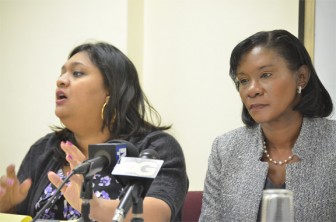Team Guyana, which reported to the United Nations Committee on the Elimination of Discrimination Against Women (CEDAW) last week in New York, was unhappy at the manner in which questions were posed by committee members and their reliance on “alternative sources” and the country will shortly lodge an official complaint.
“Guyana wishes to express some concerns as to the way some questions were posed… We wish to place on record that we will formally indicate through the respective channels our specific concerns,” Minister of Human Services & Social Security Jennifer Webster told members of the media during a press conference yesterday at the Foreign Service Institute.
Asked about the specific concerns of the team, Minister of Education Priya Manickchand, who accompanied Webster to the forum along with Advisor on Governance Gail Teixeira, said: “We expressed concerns at the frequent use of alternative sources, especially where there were information that was publicly available that would refute the information given by those alternative sources that caused the basis of a question.”

One example listed by the minister was when one committee member stated that an alternative source informed that because the public institutions do not offer abortions, Guyana has a high rate of maternal deaths. Another member said they were informed that only 13% of the hinterland population had access to information, which the ministry said was furthest from the fact.
“We respectfully call for a higher level of research to be done by members of the committee,” the education minister said.
Following Guyana’s report, CEDAW, which monitors the compliance of states with the United Nations’ Convention on the Elimination of All Forms of Discrimination against Women, acknowledged progress made on some issues, but expressed concern about women’s limited access to justice in Guyana, reported widespread discrimination against homosexuals and bisexuals, and whether the root causes of trafficking in women were being addressed.
But yesterday Manickchand said that access to justice in Guyana has been a success story. “We used to have Legal Aid in Georgetown alone but now we have Legal Aid in regions, 2, 3, 5, 6 and 10, we don’t in regions 1, 7, 8 and 9 and we must aspire to get there but practically speaking, the regions that have access to Legal Aid have 90 percent of the population. So how could you conclude that we don’t have access to justice?” Manickchand questioned.
Webster said they were quite clear on the mandate of the country, while adding that there were representatives from several NGOs in Guyana but they were not allowed to speak at the forum.
“During the session, several questions were posed by members of the CEDAW committee, which, in Guyana’s view, did not pertain to the specific CEDAW Convention and to the specific issues in Guyana’s seventh and eighth periodic reports that were submitted,” Webster added.
Manickchand said she believes that one of the results from the 23-member committee’s seeming reliance on alternative sources, which they did not name, was the downplaying of the progress the country has made. She said at least one of the NGOs that was at the forum is not known in Guyana, and while the NGOs were not allowed to ask questions they were in closed-door sessions with committee members and might have conveyed some of the questions they wanted asked.
Report
Guyana’s report, which covers 2004 to 2010, was presented by Webster and stated that Guyana is considering proceeding in line with the recommendations of the Human Rights Council’s 2010 Universal Periodic Review. She noted that the country has acceded to the Convention on the Rights of the Child and ratified the Convention on the Rights of Migrant Workers and Their Families.
She admitted that a disabling factor to accurately assessing the country’s report to advance women’s rights has been the issue of timely collection and analysis of statistics.
“Our government has been taking steps to improve the collection of accurate data including the digitisation and electronic compilation of relevant data,” Webster said.
She reported to the committee that some of the challenges that continue to face the nation on this front are the prejudices, engrained cultural barriers and male attitudes in our society which are not easily dislodged.
“However, we reiterate that the Government of Guyana remains unswerving in its commitment to honour its obligations under the convention and will expend every effort with available resources — human, financial and technical — to ensure that we continue to make progress for all our people, especially our women and children,” the minister said
Webster also said that legislative and administrative steps have boosted the proportion of women in non-agricultural paid employment, as well as their representation in Parliament and Cabinet-level posts to more than 30%. She added that Guyana’s 2011 Millennium Development Goals progress report showed notable gender-equality achievements in education, curbing infant and child mortality, and stemming poverty, thanks in part to the government’s commitment to earmarking 25% of the budget for the social sector. The minister also noted that the report highlighted key challenges in maternal health. In terms of this, she said that with just six obstetricians to attend 15,000 births annually and limited support from development partners to address that deficiency, the government had taken steps to recruit obstetricians from overseas, while placing Guyanese doctors recently trained in Cuba in outlying regions of the country.




